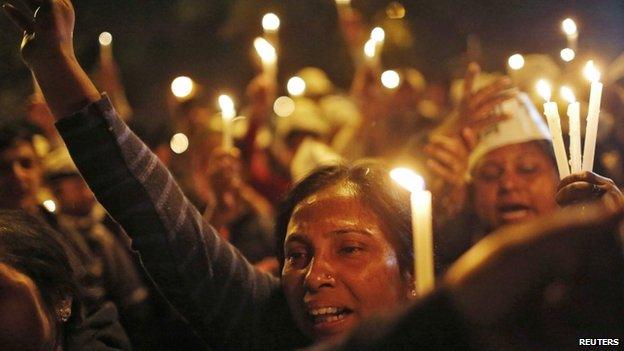Indian media: Is banning Uber taxi right?
- Published

Many have been protesting against the latest rape allegation in Delhi
Most Indian papers have backed the ban on international taxi-booking service Uber in Delhi after one of its drivers allegedly raped a female passenger.
The 26-year-old woman used the smartphone app to book a taxi home on Friday but said she was taken to a secluded area and raped.
The driver was arrested on Sunday and appeared in court on Monday afternoon. He has been remanded in custody for three days.
Also on Monday, authorities in Delhi banned Uber for "misleading customers".
Papers feel the taxi service failed to properly check the background of the driver who, according to reports, was arrested in 2011 in another sexual assault case.
"In the US, Uber follows a three-layer security check but in India it did not think it worthwhile to institute a similar system," the Hindustan Times, external says.
The Indian Express, external, similarly, asks Uber to explain why it did not follow the system of checks.
"Uber boasts of a stringent system of background checks for its drivers in the United States. It must answer now why it did not follow the same due diligence, and system of checks, in its operations in India."
The paper also criticises the company for "failure to immediately provide the authorities with the driver's information", saying it "shows a cavalier disregard of its responsibilities".
Uber is yet to react to the ban but earlier, Uber CEO Travis Kalanick said in a statement that the company "will do everything... to help bring this perpetrator to justice and to support the victim and her family in her recovery".
But the Firpost website, external feels the tone of his statement was "hardly apologetic".
"Uber's statement is buried in their website in a little corner" and takes a "lot of digging to reach", it says.
Checks or ban?
The Hindustan Times, external says the ban on Uber will not stop taxi companies from flouting rules.
"Banning the service may not change the scenario; things will be back to 'normal' in a few weeks if these checks are not carried out on a regular basis," the paper says.
It adds that the police and the legal system must also be held accountable for not being able to prevent the incident.
"If the transport department has much to answer for, the legal system and the police also have to explain the lapses," the paper adds.
Prominent columnist Siddharth Varadarajan feels the decision to ban Uber after the arrest of the suspect "will do nothing" to address the issue of women safety.
"Instead of banning companies, the Delhi government must come up with clear regulations aimed at enhancing women's safety and ensure that Uber and other providers comply," he writes on the NDTV website, external.
In some international news, Russian envoy Alexander M Kadakin has assured that Moscow would never do anything detrimental to India's security, The Hindu, external reports.
Mr Kadakin's remarks come after Russia recently signed a military cooperation pact with Pakistan.
"It's just a framework which we have with many countries and does not envisage any immediate arms transfers," the paper quotes Mr Kadakin as saying.
Russian President Vladimir Putin is scheduled to arrive in Delhi on Wednesday to hold talks with Indian Prime Minister Narendra Modi.
BBC Monitoring reports and analyses news from TV, radio, web and print media around the world. . You can follow BBC Monitoring on Twitter, external and Facebook, external.